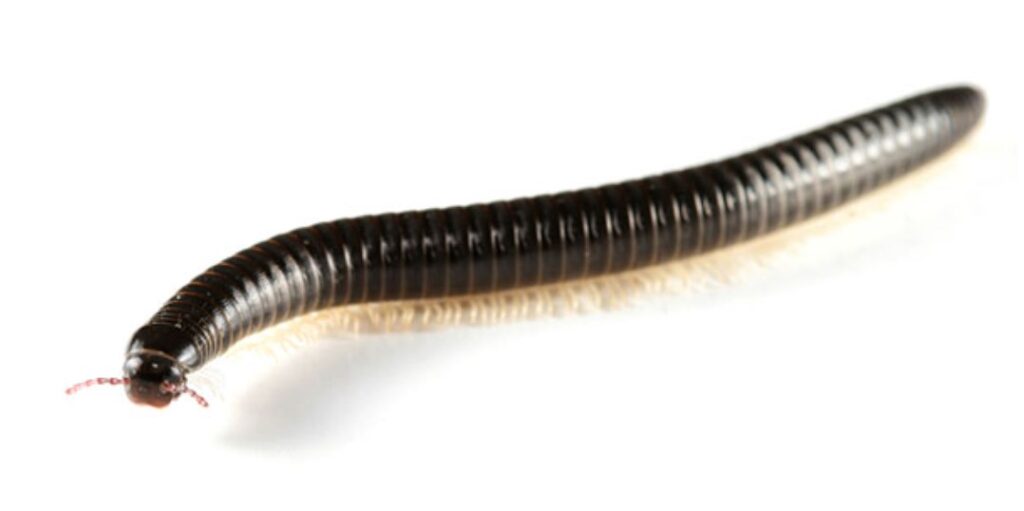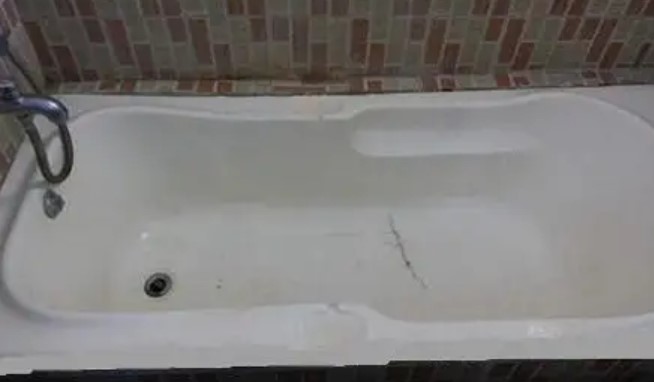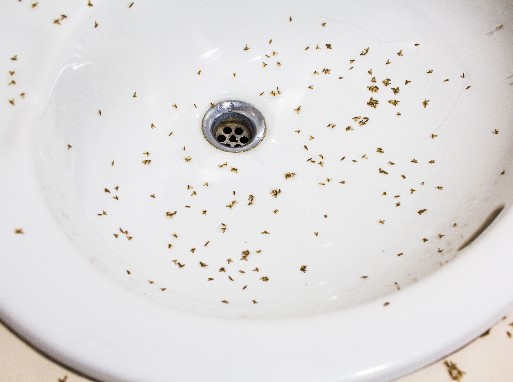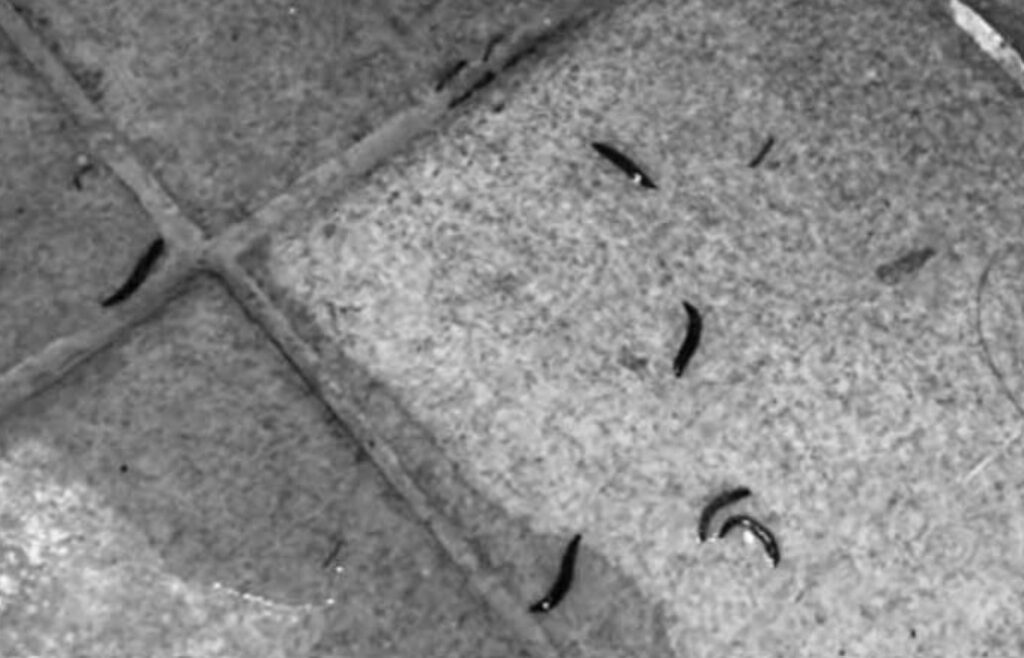Small black worms in shower can be a common and unsettling problem for many homeowners.
These tiny creatures are often referred to as drain worms or sewer flies, and they can quickly multiply and become a nuisance if not addressed promptly.
While they are generally harmless, their presence in the shower can be unsanitary and make it difficult to enjoy your daily routine.
In this article, we will explore the causes of small black worms in the shower, how to get rid of them, and preventive measures to keep them from returning.
What Are the Tiny Black Worms Anyways?
The tiny black worms that are commonly found in showers or sinks are known as drain worms or sewer flies.
They are actually the larvae of a type of fly called the drain fly larvae or moth fly. These flies are attracted to moist environments, particularly those that have organic material present, such as hair, soap scum, or food particles.

The eggs of these flies are laid in these areas and the resulting larvae, or tiny black worms, feed on the organic material until they are mature enough to pupate and become adult flies.
While they may be unsightly and inconvenient, these worms are generally harmless to humans and do not pose any significant health risks.
Causes of Drain Worms in Homes
There are several causes of shower drain worms in homes. The most common cause is standing water or moisture buildup in sinks, showers, or other areas of the home.
This moisture can provide the ideal environment for drain flies to lay their eggs and for the resulting larvae to thrive.
Organic material, such as hair, soap scum, or food particles, can also accumulate in drains and provide a food source for drain worms.

Additionally, damaged or poorly sealed plumbing can provide an entry point for drain flies and larvae to enter the home.
Finally, stagnant water in gutters or other outdoor areas can attract adult drain flies, which can then make their way inside the home.
Taking steps to address these underlying causes can help prevent the occurrence of drain worms in the home.
Why Do Drain Flies Lay Eggs in the Drain?
Drain flies, also known as moth flies, lay their eggs in drains because it provides an ideal environment for their larvae to thrive.
The damp and organic-rich environment found in drains is perfect for these small flies to reproduce and lay their eggs.
Drain flies are attracted to organic matter and stagnant water, which can be found in bathroom and kitchen drains, and they lay their eggs in the film of organic matter that accumulates on the inside of the drain pipes.

The eggs hatch into larvae, which feed on the organic matter present in the drain. They undergo several molts, and eventually pupate, before emerging as adult drain flies.
This cycle can take as little as two weeks to complete, meaning that drain flies can quickly multiply and become a nuisance in the home.
Preventing the buildup of organic matter in drains, keeping them clean and free of standing water, and repairing any plumbing leaks or damage can all help prevent the occurrence of drain flies and their larvae.
Regular cleaning and maintenance of drains and plumbing can go a long way in keeping these pests at bay.
How to check for the Black Worms in the Shower
Checking for black worms in the shower is relatively easy and can be done using a few simple steps.
The first step is to look closely at the shower floor or drain cover for any signs of movement or small black objects.
Drain worms are usually small, ranging in size from 3-5mm, and are typically black or brown in color.
They may also be seen crawling along the walls of the shower or on the showerhead.

Another way to check for black worms in the shower is to use a piece of tape. Place a small piece of tape, sticky side down, over the drain or on the shower floor, and wait a few hours.
If any black worms are present, they will likely become stuck to the tape and can be easily seen upon removal.
If you suspect that there may be black worms in your shower, it is important to take action to remove them promptly.
This can be done by cleaning the shower thoroughly, including the drain, with a mild cleaner or baking soda and vinegar solution.
In severe cases, a professional plumber may need to be consulted to ensure that there are no underlying issues with the plumbing that are attracting the drain worms.
Are shower worms harmful?
Small black worms in the shower, also known as drain worms or sewer flies, are an unpleasant sight for many homeowners.
While these tiny creatures may be unsightly and inconvenient, the good news is that they are generally harmless to humans.
In this article, we will explore the reasons why shower worms are not harmful and what you can do to get rid of them.
First and foremost, it is important to understand that shower worms are not parasitic and do not feed on human tissue or blood.
They are instead the larvae of a type of fly called the drain fly larvae or moth fly, and they feed on organic material found in drains and moist environments.
These worms are not known to transmit any diseases or cause any significant health problems in humans.

That being said, the presence of drain worms in the shower can still be a cause for concern, as they may indicate an underlying issue with the plumbing or hygiene in the home.
The buildup of organic material in drains can create an ideal environment for drain flies to lay their eggs and for the resulting larvae to thrive.
Therefore, it is important to address the underlying cause of the problem, rather than simply removing the worms from the shower.
To get rid of shower worms, you can start by thoroughly cleaning the shower, including the drain, with a mild cleaner or a solution of baking soda and vinegar.
This will help remove any organic material that may be attracting the drain flies. Additionally, it is important to address any leaks or damaged plumbing that may be causing standing water or moisture buildup in the shower or sink areas.
Keeping drains and plumbing clean and well-maintained can go a long way in preventing the occurrence of shower worms in the future.
In conclusion, shower worms are generally not harmful to humans, but their presence can be a sign of an underlying plumbing or hygiene issue in the home.
How do you get rid of shower worms?
Small black worms in the shower, also known as shower worms, drain worms, or sewer flies, can be a nuisance for homeowners.
These tiny creatures are the larvae of a type of fly called the drain fly larvae or moth fly and feed on organic material found in drains and moist environments.
While they are generally harmless, their presence can indicate an underlying plumbing or hygiene issue in the home.
In this article, we will explore how to get rid of shower worms and prevent them from coming back.
- Clean the Shower The first step in getting rid of shower worms is to thoroughly clean the shower, including the drain, with a mild cleaner or a solution of baking soda and vinegar. This will help remove any organic material that may be attracting the drain flies. Pay special attention to any cracks or crevices where organic matter may accumulate.
- Use a Drain Cleaner If the shower worms persist, you can use a drain cleaner specifically designed to remove organic buildup in drains. Be sure to follow the instructions carefully and take appropriate safety precautions, such as wearing gloves and eye protection.
- Repair Leaks or Damage Standing water or moisture buildup in sinks, showers, or other areas of the home can provide an ideal environment for prevent drain flies to lay their eggs and for the resulting larvae to thrive. It is important to address any leaks or damaged plumbing that may be causing these issues.
- Use a Fly Swatter or Sticky Tape If you see any adult drain flies in your shower, you can use a fly swatter or sticky tape to catch and remove them. This will help prevent them from laying more eggs and continuing the cycle of infestation.
- Consult a Professional In severe cases, a professional plumber may need to be consulted to ensure that there are no underlying issues with the plumbing that are attracting the drain worms.
In conclusion, getting rid of shower worms involves a combination of cleaning, maintenance, and repair.
By taking these steps, you can keep your shower and home free of these pesky pests.
Remember to address any underlying issues that may be contributing to the problem to prevent the occurrence of shower worms in the future.
FAQ:
Are black drain worms harmful?
No, black drain worms are generally not harmful to humans. They are the larvae of drain fly infestation and feed on organic material found in drains and moist environments. While they may be unsightly and inconvenient, they are not known to transmit any diseases or cause any significant health problems in humans. However, their presence may indicate an underlying plumbing or hygiene issue in the home that should be addressed. Read also…

